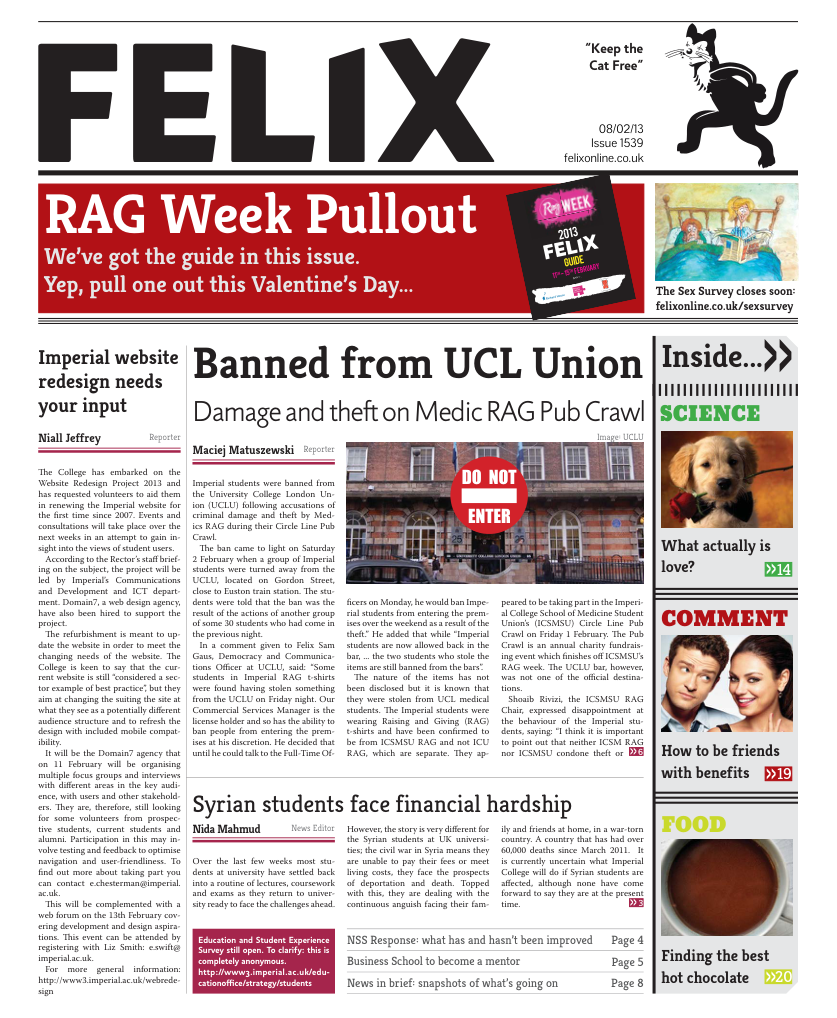The Life of a Total (W)Banker
The City life ain’t all it’s cracked up to be, warns Adam Billing

You’ve finished your degree. You worked hard and you got the grades. The world is your metaphorical oyster. With your hard earned piece of paper you can do whatever your heart desires. So why do nearly a third of us end up working in the financial services?
With banks as public enemy number one, the City is facing a crisis. New regulation promises to limit risky casino banking and with it the large profits and bonuses they brought are likely to disappear. So is finance a dream job to aspire to or do Imperial students just lack imagination? Let’s meet one of them.
“Hello Lance. I hear you want to be a banker.” “Yes, it’s the best job and I want to be the best,” replies Lance. “Why do you think it’s the best?” “Well it pays the most.” “But you’ll be very time-poor.” “That’s okay. I’ll only do it for five years, become rich, then leave.”
This is a conversation we’ve all heard a hundred times before. It sounds reasonable, but does Lance’s viewpoint actually stand up to scrutiny? Let’s look at a real-life example. A 2008 Maths graduate got a job working in Mergers & Acquisitions for Goldman Sachs – this is basically Lance’s dream job. His starting salary was £35,000 and he would usually clock around 85 hours a week. This works out to £7.90 per hour, which is actually below the London Living Wage. So Lance would be financially better off if he were to spend those hours cleaning the office rather than playing with spreadsheets. It’s true that Lance’s salary progression is better than your average cleaner’s, so one day he’ll outdo Dorris. But it’s ludicrous to think you can make a life-changing amount of money in your first five years.
“That’s okay,” pipes up Lance, “I’ll do it for ten years then.” “Well Lance, firstly, I’m glad that your life plan is so well thought-out that a ten second calculation can throw it off course. But if you want to make serious money you’re going to need to climb the corporate ladder.” “So how do I do that? Be the best at my job?” “Silly Lance, these jobs could be done by a four year old. You’ll never stand out that way. If you want to progress you need to brand yourself a winner, and that’s an expensive business. There’s no living like a student anymore. To act the part you need the expensive suit, Omega watch and to be blowing your money on nights out in Mayfair. If the team jets off to Monaco for the weekend, then that’s what you do too whether or not you can actually afford it. Managing relationships (read: sucking up) is key in this industry and you need to do your part, otherwise that next promotion won’t be coming your way. Unfortunately, with all this spending it’s going to be difficult for you to amass that fortune you were talking about.”
Why is Lance so keen for cash? I’m not entirely sure he knows. But let’s get one thing straight: money is not a reason in itself. No one actually wants a pile of cash. What Lance is after are the things that money can bring: financial freedom, lifestyle, a big house (status) and a fast car (penis extension). So is a City career the best way to achieve these things?
I have a confession to make: I was once a Lance. I went off to the City to seek my fortune, but instead this is what I found.
Financial freedom: because of the pressures to “live the lifestyle” my colleagues were the most indebted individuals I have ever met. There were people on £300,000 salaries that were “leveraged” ten times their earnings – i.e. they owed the bank three million quid! Losing your job with that much debt means immediate and definite financial ruin. In fact, most were screwed if they didn’t get the right bonus. This is as far from financial freedom as I can imagine.
Far from being an isolated incident, massive leveraging is rife. It’s fuelled by the belief that you’re top dog; you’ll be richer next year so why worry about today. This short sighted thinking can leave you trapped in a job you have tired of and leads to bodies littering the pavements of St. Paul’s when financial crises break.
Many enter the City with the belief that they’ll do it differently. Unfortunately, The Square Mile is a tribal place. If you’re not with them, you’re against them. If you don’t take part in the lifestyle, part of which is living above your means, then you’re implicitly critical of those who do – which is everyone. People will mistrust you and you won’t form the relationships you need to be successful.
Lifestyle: You’re never going to become Roman Abramovich by being a banker. It’s a well-paid job but it’s still just a job and selling your labour is not a scalable business model. However, there’s no denying that bankers are generally wealthy. So what do they do with all that money? What experiences do they have, that we mere mortals can only dream of? Well as far as I could tell, their experiences weren’t that dissimilar to my own: they lived in a house, drove a car, occasionally went to restaurants and would go on holiday once or twice a year. The difference was they would spend a lot more money doing these things.
If they went on holiday it had to be somewhere with ‘service.’ I mean what’s the point in money if you can’t make plebs do things for you? The car has to be new and replaced frequently. My boss even paid £800 to have his Range Rover resprayed because a cat walked across the bonnet. The main goal of these excessive expenditures seems to be so you can talk about them loudly in the office. So I don’t think it was appreciated when I suggested that a £5.99 bottle of T-Cut would have done the same job.
Status: It might impress your mum but is it really a high status job? Status is in the eye of the beholder. So if your aim in life is to impress Mayfair airheads then congratulations, you’ve found your calling. But they don’t understand what it is you actually do. The truth is, depending on your job title, you’re somewhere between an Excel monkey and a PowerPoint monkey; you’re doing a job that doesn’t challenge you and whose only social worth is to make rich people richer. So whom are you looking to impress? And is it worth it?
Everyone has different aspirations in life and it’s not for me to tell you how to live yours. However, the Imperial view of the City is far from the reality I encountered. Hopefully a few more people sharing their experiences might counter the multi-million pound propaganda machine that we are fed in College.
But for those still determined to follow in Lance’s footsteps, a final word. We don’t live in the 80s anymore. The mantra of “greed is good” has failed and there is a deep mistrust of the complex financial instruments that Imperial students were employed to deal with. In the coming years the City will face heavy regulation, and with it the inflated profits and bonuses they produced will vanish. Sure it won’t happen overnight, but why get on a sinking ship?
There are more career options than finance, aPhD or teaching: change the world with an NGO; join the cyber war by breaking codes at GCHQ; or be the next David Attenborough. Science and technology are the future of our economy so why not join a start-up, or better yet, create your own. Your 20s are when you are most free to take risks, don’t waste them on a grad scheme making tea for Lance.








